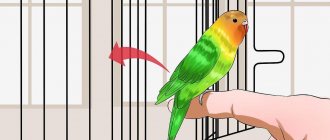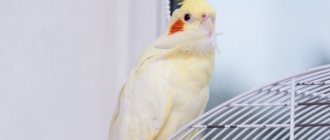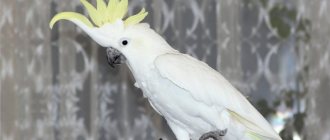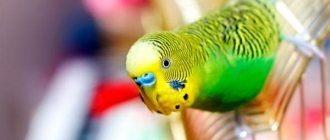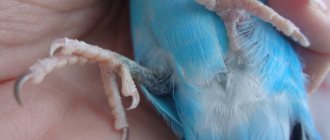Before purchasing a parrot, you need to become familiar with its behavior. These birds are distinguished by their ability to speak, and also delight their owners with a wide variety of sounds, mostly very loud. They love to talk to their partner when parrots are kept in pairs, with a person, or simply hum their bird songs. The silent feathered friend should cause concern in his owner. No healthy bird will remain silent all the time. This can be a sign of illness, injury, or other disorders. There are many reasons why a parrot does not tweet, let's look at the most common ones.
Why is the parrot silent and not tweeting?
The term "quiet" at first glance does not fit with the bird nature known for its chirping and chirping. However, there are a number of calm birds. They are suitable for living in apartments or houses with residents who prefer silence. There are several species of birds known for their calmness:
- Passerine parrot;
- Corella;
- Senegal parrot;
- Pionus;
- Budgerigar.
Each of these representatives will be an excellent companion and does not require much attention. It should be noted that even these birds are very sociable; they all make sounds, but due to their small size, not as loudly as their large counterparts:
- Macaw;
- Cockatoo;
- Jaco;
- Necklace parrot;
- Amazon.
But there are times when a parrot sits and is silent. The bird stops communicating for several reasons:
- health problems;
- adaptation to a new place;
- meeting the new resident of the apartment;
- character traits;
- loneliness;
- upset about something, scared;
- females are simply quieter;
- age.
This list is, of course, incomplete, but contains the most common problems that apply to this situation. Let's look at each point in more detail.
Got sick
The parrot does not chirp - this may be one of the symptoms of the disease. Birds deteriorate very quickly, so time is a valuable ally when it comes to identifying and treating disease. A completely healthy parrot looks like this:
- The parrot stands upright on its perch.
- Its wings fit tightly to its sides at the same height.
- The balance is not broken.
- The eyes are clear and wide open. He watches everything that happens with curiosity.
- The feathers are smooth, do not bristle or tuft.
- Appetite is good.
- The bird is cheerful, active, flies well, makes sounds.
- Breathing is even.
When a parrot is sick, its behavior changes. He can go down to the bottom of the cage and sleep constantly. His feathers are ruffled, as if he is cold. The whole posture of the bird indicates a problem: the eyes are half-open, the wings are drooping, the activity is imperceptible. Lack of appetite and liquid droppings are important signs of the disease. Unusual aggression of birds or, conversely, isolation, lack of a speech signal - all these changes indicate pathology. You should immediately seek help from a veterinary clinic.
Adaptation to a new home
A parrot that was just bought and brought home may not make a sound for the first 2-3 days. This is how he adapts to changes. The bird suddenly finds itself in new conditions; it needs time to adapt. Even a parrot that can talk, in a new apartment with people still unfamiliar to it, will stop chirping. In the first days, it is recommended not to disturb the bird, not to pick it up or let it out of the cage. When there are already other birds in the house, it is advisable to keep the new member of the flock in another room for about a week - this is how quarantine works. It becomes possible to detect the disease in time and not infect the entire flock.
The new resident should have a cage with everything necessary and peace. If you can see that everything is fine with your health, then after quarantine you can start getting to know all the residents of the apartment. It won’t take long for the bird to adapt and become a good, cheerful friend.
Loneliness
In nature, parrots fly in a fairly large flock. They find food together, sleep on one large tree, spend time communicating with each other and pairing up for nesting. When a parrot sits alone in a cage, it becomes bored, naturally there is no one to talk to, the situation especially worsens for busy owners who are absent for a long time. One quickly gets tired of tweeting and the bird falls silent.
Important! Parrots tend to pluck themselves out of boredom. They pull out their feathers, which can cause infection in the resulting wounds.
Showing more attention to your little friend will help improve the situation. In this case, you need to communicate with him. Open the cage, giving the opportunity to fly. There should be toys in his house. If you don’t have time for him at all, then it is recommended to get him a partner of the opposite sex. With paired content there will be noticeable progress:
- Your mood will improve;
- Becomes more sociable;
- They will learn each other's habits.
Character
Most parrots are social creatures, but there are exceptions. Melancholic introverts are absolutely healthy, but do not show activity towards their relatives. Such a parrot is silent and spends time in a cage, even if it is always open. Over time, you can become friends with him. He will walk in your arms, but you shouldn’t expect progress in the “conversation” from him.
Bad mood
Parrots are smart, but touchy. The mood changes depending on the season. In winter they are less active, especially when the apartment is cool. They prefer to sit on a perch, half asleep. The end of winter also leads to more withdrawn behavior. You can cheer him up by bringing him fresh young greenery and permitted tree branches. If there are no symptoms of the disease, then silence and inactivity indicate adaptation to the new season or weather changes. Even when indoors, birds are able to sense their environment.
Parrot - female
The parrot is silent and does not chirp, but is absolutely healthy - this may be a manifestation of individual character or gender. Males are more active than females. Girls are practically unable to master human speech. They don't sing songs, unlike boys. The adaptation period for a lonely female can be prolonged and making friends with them more difficult. They are not so active in making contact, of course, and among them there are happy exceptions. Also, females experience hormonal surges, then aggression, refusal of food and any contact with humans are noticeable.
Age-related changes
If you bought a parrot and it does not chirp, perhaps an unscrupulous seller came across an unscrupulous seller at the pet store and sold the elderly bird. At an advanced age, parrots are calmer and often do not tweet, fly little, and do not learn new words.
On a note! The lifespan of each parrot species is different. For example, a budgerigar lives about 10 years, a cockatiel from 15 to 30 years.
Symptoms
Along with the absence of a voice, the bird may exhibit signs of illness, which include the following symptoms:
- the parrot constantly opens its mouth;
- eats very little;
- does not leave the cell;
- sleeps poorly;
- loses weight and loses strength;
- there is a violation of the consistency of the litter;
- cough;
- change in color and structure of the wax;
- the plumage has lost its saturation;
- lack of response to external stimuli.
How to help
- If the bird is sick, timely medical attention is essential. In small birds, all processes proceed quickly. Knowing the main symptoms, you cannot postpone a visit to the doctor until later.
- During the adaptation period, do not disturb or frighten the bird. Talk in a calm voice, slowly accustoming her to you.
- To smooth out the seasonal blues and improve the quality of life of an adult bird, regular vitamin intake and protection from stress are recommended.
- In cases of boredom from loneliness, one of the options is possible: get a friend, but only of the opposite sex, or give the pet more of your own attention.
What can you do
If you are lucky enough to buy an older parrot, humble yourself and provide the bird with a peaceful old age. In other cases, you can make attempts to fix something.
Expert recommendations on how to make a parrot tweet:
- Buy a pair for a phlegmatic parrot or a female. In budgerigars, sex is determined visually. Other species will require genetic testing.
- If the change in behavior is associated with a move, give the bird a little time to adapt. Do not disturb him unnecessarily, protect him from the noise and curiosity of other pets. The bird should not be released from the cage during this period. As soon as the parrot feels protected, it will begin to trust its owner. Then you can start talking to him kindly.
- If the reason for silence is loneliness, try to pay more attention to the bird. If free time is limited, play recordings of nature sounds, birdsong, and conversations of other parrots. Provide your pet with a variety of toys, hang a mirror and a bell in the cage. But the best option would be to buy him a pair.
- Changeability of mood is treated by creating comfortable conditions. Limit stress factors, pay more attention. Make sure your bird's diet is balanced.
- At the slightest sign of illness, immediately consult an ornithologist. Don't try to treat it yourself. Incorrect manipulation can only worsen the pet’s condition. Budgerigars are susceptible to vitamin deficiency, so they need regular vitamin supplements and sunbathing. Observe sanitary and hygienic standards for keeping birds in a cage.
Don't panic if your bird is sad and doesn't chirp. Observe her, analyze her behavior. Perhaps the reason for the behavior change is quite harmless. Create favorable conditions for your pet, provide proper nutrition and do not leave it alone for a long time. The parrot will live a long life, delighting with its chirping.
Health reasons
Poisoning
If a parrot exhibits the following symptoms along with a long daytime sleep, this indicates that it has been poisoned.
- Nausea appears, accompanied by vomiting.
- The stools are liquid. Their color has changed.
- Coordination of movements is impaired.
- Convulsive conditions occur.
Poisoning can be caused not only by poor nutrition or water, but also by cigarette smoke, toxic fumes from varnishes or paints.
The parrot is lethargic
Internal parasites
The appearance of parasites in a bird’s body disrupts its immune system, causing weakness and drowsiness. Malicious “tenants” also contribute to the poisoning of the bird by releasing their waste products into its body. An ornithologist veterinarian will help identify the presence of such infections or exclude them.
Cold
A parrot's sleepiness may be caused by a cold. In such a situation, the bird will have the following symptoms:
- hard breath;
- fever;
- discharge from the respiratory openings;
- refusal to eat.
If help is not provided on time, pneumonia may develop.
When can you let a parrot out of its cage?
How to teach a parrot to fly and how to catch it? If the bird began to play and have fun, if he became active, then this is a sure sign that he is getting used to the house. After two to three weeks, the bird can be released. To make him feel happy, a 10-minute flight without a cage will be enough.
Birds love to explore the house and perch in the places they like best. Perhaps it will be a wardrobe door, or perhaps a beautiful chandelier under the ceiling. There is no need to be afraid, the feathered creature will definitely not cause harm. His nails are small and harmless. Life hacks for parrots can be found on the Internet or read in a book. For example, you can put a parrot on your shoulder.
Is it necessary for the wavy to fly?
It is vital for parrots to fly, as it has a positive effect on their health and mood. It is advisable to allow such walks only in the presence of a person. Before releasing the bird from the cage, it is recommended to make sure that there are no dangerous objects.
If the bird does not fly regularly, this leads to negative consequences:
- obesity;
- amyotrophy;
- weakening of bones and joints;
- the appearance of depression.
But sometimes there are situations when, even with the cage open, the bird refuses to come out or fly. You just need to wait until the wavy stops being afraid and gets used to the situation. If the bird suddenly stops flying, this may be due to stress, disease or parasites.
A bird that flies around the room every day always feels good and does not become overweight. Flying is a great way to get rid of apathy or melancholy. If you do not give the bird the opportunity to get out of the cage, it will become depressed.
Even if a bird refuses to fly for various reasons, it is advisable to let it out of the cage so that it can explore the surrounding area on foot. Some wavy cats happily ride on their owner's shoulder.
Options for solving the problem
After determining the cause of the loss of talkativeness, restorative procedures should begin. If the bird has experienced stress, then increased attention and care is required. The bird can speak again when it feels the good energy of the owner. Parrots may forget words that were previously spoken, and after stress or injury, learning to speak again is required. In this case, the owner must resume lessons. If the bird could previously repeat human sounds, then it is quite possible to restore speech. If accompanying symptoms are detected, treatment of the pet should be started. When the bird recovers and begins to chirp, it can independently begin to speak previously learned words.
To avoid problems, you should protect your pet from possible stressful situations. Do not allow to fly in the absence of the owner to avoid injury. Taking care of your pet and constantly monitoring its health are the main aspects in achieving a positive result.
Heart diseases
Most parrots in captivity live in conditions of physical inactivity. The most common consequence of such improper maintenance is chronic heart disease.
Parrots and budgerigars often develop heart failure. Signs of heart failure in a parrot are: passivity, drowsiness, and reluctance to fly. Parrot owners often describe this condition as “the parrot is too lazy to fly.” Remember, flying is the normal and preferred mode of movement for a healthy parrot. A healthy parrot is active, curious, and loud. If a parrot is “lazy”, it means it lacks the physical stamina to fly, most often this is due to heart failure. Another common symptom of heart failure is, already described above, “pushing food out of the crop”; due to the fact that the blood-filled dilated atria compress the esophagus, disrupting the normal passage of food from the crop to the stomach, so the parrot begins to stretch its neck and yawn.
Heart failure is very common in cockatiels. There is an assumption that cockatiels have a genetic predisposition to heart disease or that there are breeding lines where such a predisposition or myocardial defect is inherited.
In Amazons, African Grays, Macaws, and Cockatoos kept in conditions of insufficient activity, heart failure begins to manifest itself at the age of 2-3 years, gradually progressing.
The diagnosis is made on the basis of the clinical picture, x-ray (in this case, distortions in the shape of the heart and size are visible on the x-ray), and ECG. Treatment of a parrot for heart failure is complex. It includes identifying chronic infections, adjusting the diet, gradually increasing physical activity, and using specific medications. Treatment lasts a very long time, since the disease itself is usually noticed at a time when the bird’s condition is already very poor.
Another common heart condition in parrots is high blood pressure (hypertension). The reason lies in improper maintenance and feeding of the parrot. Chronic high blood pressure leads to kidney and liver diseases, and a whole series of processes develop that destroy the bird’s body. In parrots without facial feathers (browns, macaws), signs of high blood pressure include redness of the skin and hysterical behavior. The treatment is complex and includes mandatory correction of the diet, living conditions and communication with the bird, courses of special medications that lower blood pressure and normalize the functioning of the liver and kidneys.
Read also: Psychology of a man biting
Other reasons
Improper environmental conditions affect a bird’s sleep no less than various diseases.
Sleeping pattern of a budgie. What you need to know?#Budgerigar#parrot#care and maintenance lessons
Not enough light
If your pet's cage is always in twilight, then it will be impossible for the bird to determine whether it is day or night. Lack of light reflexively entails a state of sleep or drowsiness.
Freezing
When the parrot is cold, it hides its head under its wing, using its plumage as a blanket. Even if the pet is awake, it creates the feeling of constant dozing. But the bird is just trying to keep warm.
Fear and stress
A frightened budgie will rush around the cage all night. Often the cause of this condition is sudden loud noises or too harsh and bright light. These birds are very shy, it is quite easy to cause this condition in them.
Corella Kesha is a tame parrot and sleeps like a cat. Loves to scratch. Dachshund in the frame.
